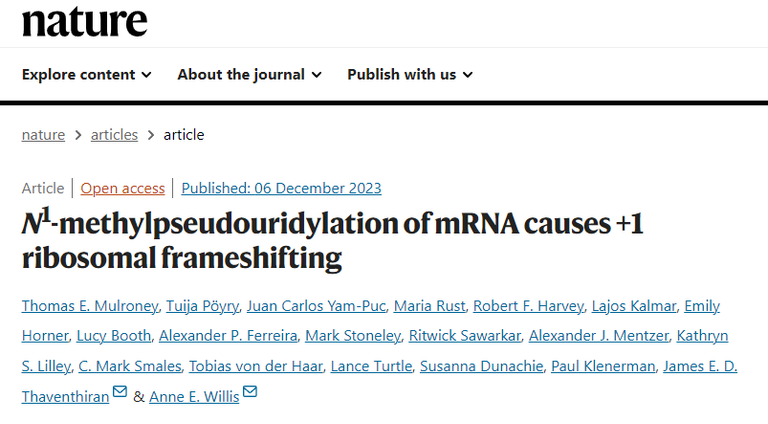Nature study: mRNA vaccines produce random proteins
Even by those who, in recent years, have sanctified the so-called Mrna technology vaccines, without recognizing the slightest question about their efficacy and safety, found it hard to disregard evidence that was published in Nature on December 6. Despite their widespread use, surprisingly little is known about how ribonucleotide modification affects protein synthesis, particularly for the translation of therapeutic mRNAs. This study, which originates from the Toxicology Unit of the University of Cambridge, explores the intricate mechanism of protein production through Mrna technology.
This work primarily studies what is known as the ribosome's "slip," or stumble, which occurs when it scans the RNA chain randomly, skipping a base and interpreting the remaining code in a completely different way, resulting in the production of a new protein. This can be anything completely arbitrary.
The study's three phases—an in vitro phase, rat studies, and a comparison of 20 individuals immunized with the Pfizer product and another 20 with Astrazeneca—allowed the researchers to gather cross-referenced data. Researchers have shown that Mrna medicines can cause the creation of undesirable, if not fully random, proteins that have the ability to randomly activate the immune system through a mechanism known as ribosomal slippage.
Initially, they confirmed in vitro that the Pfizer vaccination causes these ribosomal reading slips, which result in the synthesis of other, less well characterized molecules that are likely immune system stimulants rather than the Spike protein.
When describing the potential real ramifications of their finding, the writers exercise considerable caution, stating It is crucial that the mRNA sequence be altered to minimize ribosomal sliding events in order to facilitate the application of mRNA technology in the future, even if there is no proof that the frameshifted proteins produced by the Pfizer immunization in people are linked to unfavorable consequences. The study does not, however, go into great depth on the potential repercussions of producing undesired proteins.
The writers end here because, in general, they believe that further research is necessary to fully understand the implications. Naturally, these are ramifications that might theoretically affect the efficacy and safety of goods that employ this technical solution to stabilize RNA.
They don't take anything else into account. Instead, we may immediately begin a series of contemplations and conversations about the unknowns and uncertainties present in this technology that is being created, as we have come to expect, "at the speed of science."
Consequently, the Cambridge researchers' discovery either adds to or resolves the numerous issues with Covid vaccinations that have been raised thus far. The work is focused on the modified nitrogenous base technology—that is, the same technique that won Katalin Karikó and Drew Weissman the 2023 Nobel Prize in Medicine—and should be emphasized.
I can't help but think of Kathrin Jansen, the former head of Pfizer's vaccine research and development who is now retired. She said in an interview with Nature magazine that the people working on the so-called Covid vaccines had to get creative because they couldn't wait for the data and had to take a lot of risks. Even as they were creating the plane, they were flying it.
